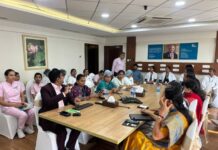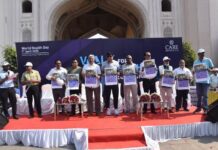New Delhi, September 26, 2020: To elucidate the role stakeholders can play in shaping the future of tech enabled smart care, ASSOCHAM organized “HealthTECH Convention – Reshaping Healthcare in India” as one of the important verticals of SMARTecIndia2020 – India’s 1st and largest week long exhibition on Smart Technologies starting from today.
The Chief Guest of the conference was Dr. Rakesh Sarwal, Additional Secretary, NITI Aayog and Guest of Honour was Shri Jayesh Ranjan, Principal Secretary, Department of Industries & Commerce and IT, Electronics & Communication, Government of Telangana. The other prominent panelists including Mr. Mahesh Kapri, Managing Director, GE BEL & GM – Supply Chain, GE Healthcare India, Mr. Rakesh Chitkara, Chairman, ASSOCHAM National Council on Pharmaceutical & Biotechnology and Senior Director, Global Government Affairs (South Asia), Abbott Healthcare, Dr. Pushpa Vijayaraghavan, Director, Sathguru Management Consultants and many more from government department, corporate world and industries.
Addressing the conference Dr. Rakesh Sarwal, Additional Secretary, NITI Aayog said, “The unprecedented constraints in the times of COVID-19 have been a blessing in disguise – clinicians and healthcare delivery providers have now embraced digital technologies as a standard way of functioning. Healthcare providers have been quick to act and made sure that clinical care continues to be uninterrupted. The resilience of the providers gave birth to a rapidly evolving landscape of technology acceptance.”
“In addition to the COVID-19 led collateral benefit of technology acceptance, policy impetus and enablement has been another major driver. Policy impetus has been through a progressive set of measures that was steered by several key stakeholders. The March 25 th guideline provided much needed legal credence to tele-consultation and enabled virtual engagement that allowed healthcare delivery to function despite the COVID-19 constraints. A key building block in the enabling ecosystem creation was NII Aayog releasing the ‘National Health Stack (NHS)’ to support the implementation of the Ayushman Bharat Yojana (ABY) across the country. The NHS that was envisaged to be a digital platform that will help implement ABY at scale across the country. The key components of the health stack are the National Health Electronic Registries, a Coverage and Claims platform, a federated personal health records framework and a national health analytics platform, all of which together aim to improve access and affordability of healthcare, facilitate national health programmes, monitor insurance policies and claims, and boost medical research and health analysis,” he added.
Shri Jayesh Ranjan, Principal Secretary, Department of Industries & Commerce and IT, Electronics & Communication, Government of Telangana said, “This pandemic has made us fully aware that one can prepare as much but still there will still be so much left to do in Covid like situations. Not just in India even in countries where good healthcare systems are there have come to realize this. However, the pandemic is timely message for all that investments need to be made and assessment of the health care requirements of the people needs to be done in a completely different manner. In post covid revival strategies digital tech definitely going to play a very big role”.
Mr. Rakesh Chitkara, Chairman, ASSOCHAM National Council on Pharmaceutical & Biotechnology and Senior Director, Global Government Affairs (South Asia), Abbott Healthcare said, “Health care in India faces several challenges including inadequate access, low insurance penetration and a growing chronic disease burden. Technology infusion along with expanded infrastructure and efficiencies from process improvements, could not only help improve health care accessibility and affordability but also quality. With the amalgamation of automation and healthcare in India, the sector is poised to establish new landmarks. Digital health has an undisputable role in shaping the future of our health and well-being and increased public health engagement and its adoption is vital to ensuring a future where the benefits of digital health for all is realized.”
Sharing his perspective on Healthcare Industry, Mr. Mahesh Kapri Managing Director, GE BEL & GM – Supply Chain, GE Healthcare India said, “Healthcare is seeing the most accelerated transformation during the ongoing pandemic; covering all aspects of patient care and administration. Digital technologies such as AI, machine learning, deep learning, cloud, blockchain, advance analytics etc. have transformed every facet of modern life and of course healthcare is not an exception. Digitization in healthcare has played critical role in driving access and affordability, improving accuracy & speed of diagnosis and reducing the dependency on limited resources. AI in healthcare is the beginning of life changing automation, AI based medical bots can analyse symptoms, detect diseases and suggest right medicine. Indian Innovators are already making bio bots to automate retinal scanning, mammography & ECG interpretations. AI can also help in evidence based treatment. Also, I feel that the recent announcement by our Hon’ble Prime Minister of the National Digital Health Mission is expected to bring efficiency and transparency in the Healthcare services in the country’.
ASSOCHAM and Sathguru Management Consultants released the White Paper on Technology led Transformation in Indian Healthcare. The White Paper emphasizes the ripe landscape for transformation, the opportune timing and the way forward for realizing impact at scale. As India progresses towards the lofty objective of universal healthcare, glaring capacity gaps in infrastructure and clinical / non-clinical expertise in the $280Bn Indian healthcare industry are a reminder of the much needed leapfrogging. Over the last decade, a combination of stimuli such as non-dilutive Government and philanthropic grants and entrepreneurial momentum have led to a robust pipeline of ventures developing health tech solutions. The ASSOCHAM – Sathguru report points to 2000 ventures of which about 200 are equity funded with collective capital raised of around US$ 1.5 billion. Albeit, value realization at scale has been largely amiss due to multiple factors such as resistance of clinicians and healthcare delivery institutions and low digital adoption. COVID-19 led behavior change has been a blessing in disguise. In a survey conducted by Sathguru amongst clinicians, a whopping 95% alluded to behavior change on technology adoption during COVID1-9 and 80% of the respondents embracing tele-consultation during these unprecedented times. The opportune timing is supported by enable ecosystem created by policy stimulus. Progressive measures commencing from the National Health Stack, National Strategy on Artificial Intelligence, tele-consultation guidelines and most importantly, the National Digital Health Mission blueprint and formal announcement all foster an ecosystem support for the digital revolution. The decade ahead will be one of digital transformation in Indian and Indian health tech ventures making their imprint on the global stage.
Corporate Comm India (CCI Newswire)























